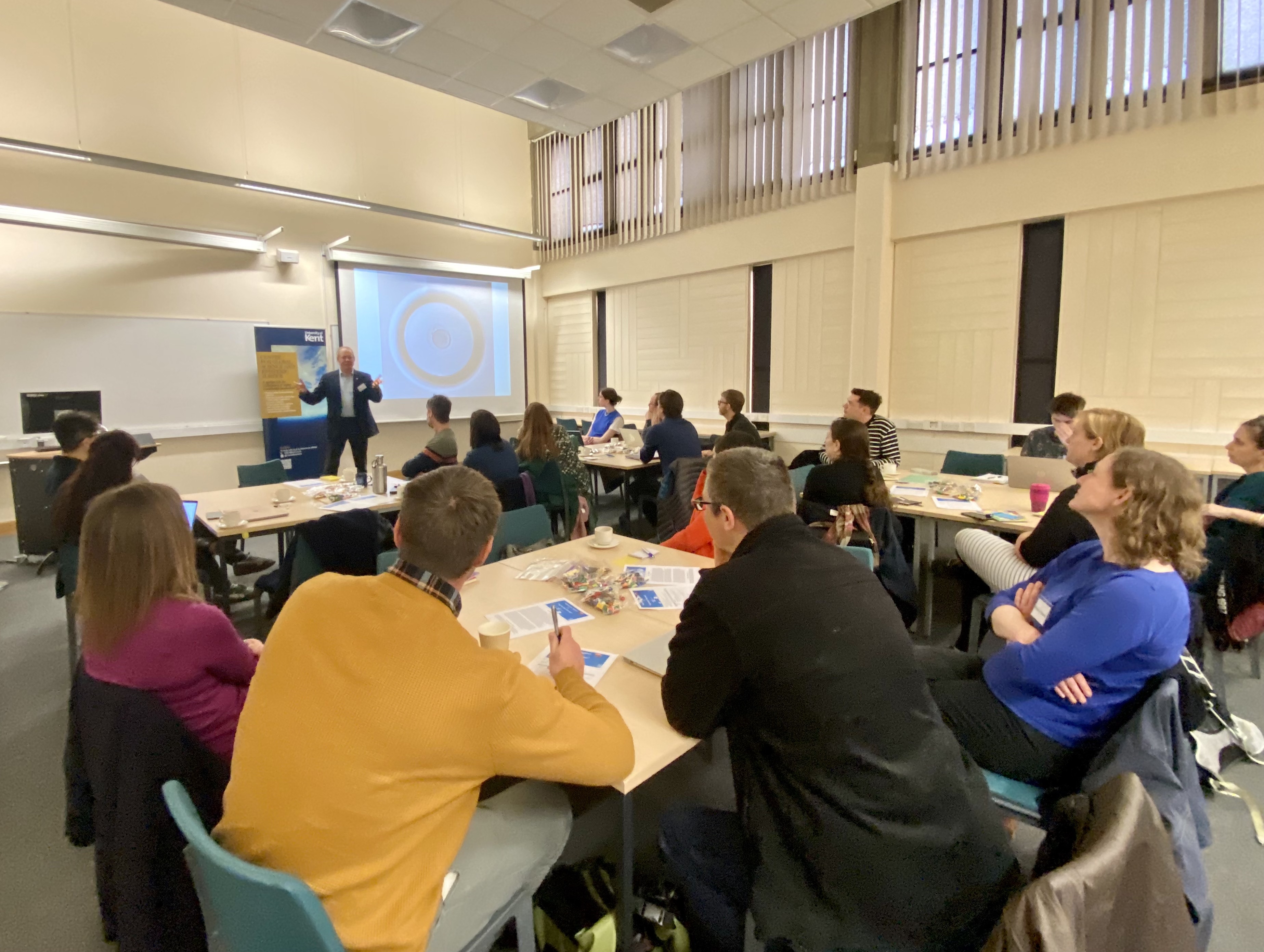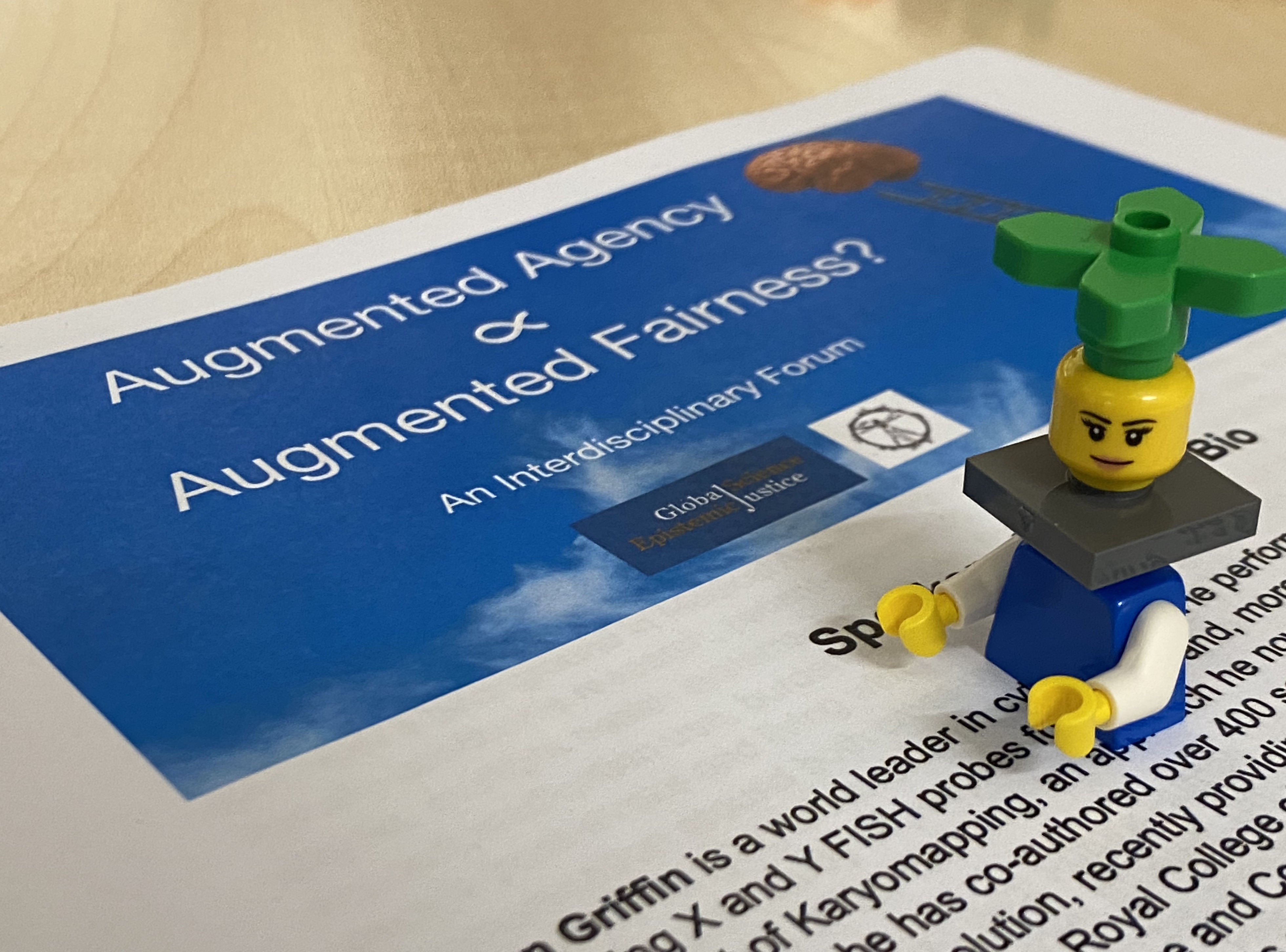By Agustin Sanchez Cotta ( Visiting PhD candidate, University College London)
If current technical capacities can augment our agency, what impact does it have on our social environment? Does this lead to a better world? These are the questions that underlie the notion that augmentation inherently signifies progress, which needs to be thought carefully. Conversely, augmentation technologies needs to be investigated and considered, as it entails ethical considerations of justice that must be addressed beforehand.
To better confront these compelling challenges, the Centre for Global Science and Epistemic Justice hosted the forum ‘Augmented Agency ∝ Augmented Fairness?’ between 26 and 27 April. For two days, a transdisciplinary group of expert speakers approached this matter from sociological, medical, biological, pharmacological, computational, anthropological, and philosophical perspectives. In addition to traditional conference presentations, the forum encompassed creative elicitation methods to open up discussions about human, agency, and fairness. This includes the opening Serious Lego Play session led by Dr. Stevienna de Saille (Sheffield) which provided participants with an opportunity to break away from traditional academic discourses surrounding the definition of human nature and the implications of human enhancement technology. The session allowed participants to approach these questions anew.
Talks in biosciences aim to debunk myths surrounding designer babies and the creation of master races, address issues of scientific communication, and explore the impact of social inequality on scientific agency. Professor Darren Griffin’s keynote speech highlights classical bioethical concerns related to reproductive technologies, including the instrumentalisation and commodification of humans through practices like IVF and PGT. Emerging new technological possibilities of selecting embryos raised new scenarios for ethical deliberations on the rights to open future, and on Parfitt’s non-identity problem. Professor Martin Michaelis raises concerns about oversimplification in scientific communication, acknowledging the importance of bridging the gap between experts and non-experts while cautioning against stifling informed discussions. He highlights the problem of post-truth discourses, where scientific knowledge is misused by cherry-picking data to serve personal interests. His intuition enunciated the problem of post-truth discourses as elaborated by McIntyre: the misuse of scientific knowledge by oversimplifying and cherry-picking data in the speaker’s best interests. If society cannot achieve good scientific communication, how can it be part of the discussion? Dr. Jill Shepherd illustrates how racial disparities in blood stem cell donation impact the chances of finding suitable unrelated donors for BAME patients, emphasising that social inequalities also limit the agency of science. The interdependence of science and society is evident.
Different disciplines have different technical and ethical framings to human augmentation discussions. From the field of computational sciences for example, Dr. Jim Ang explores the extension of connections with the deceased through VR-AI avatars, constructed from their digital footprints, to enhance the experience of parting. While psychology traditionally emphasises the importance of ‘letting go and moving on,’ the prospect of providing individuals with an opportunity to bid farewell to their loved ones is increasingly intriguing. However, it is crucial to acknowledge the potential risk of emotional exploitation by private companies. From Sports science, Dr Lex Mauger demonstrated how technical possibilities may compel us to reexamine the values we associate with fundamental activities in human societies. Recent developments in non-steroidal and anti-inflammatory drugs have shown promise in alleviating this pain and enhancing athletic performance. However, considering the world’s anti-doping code, pain is often perceived as a testament to dedication and commitment in sports. If pharmacology enables the expansion of athletic capacity, should we resist its use or redefine sports as an activity devoid of pain?
Research from the social sciences and the humanities adds another dimension of how agency in general and human agency in particular can be viewed. Professor Lubomira Radoilska argued that a genuine human action is rooted in a ‘space of reasons’, and it has to be understood socially. This approach to action not only develops important features such as ownership, authorship, and intelligibility, but also promotes social responsibility, which is indispensable for distinguishing technological augmentations from manipulations. Drawing on Stiegler’s work, Dr. Ben Turner used the concept of proletarization to elucidate how technology manipulates human agency, leading to a relinquishment of ownership to the very technology itself. While Stiegler refrained from assigning moral judgments to this phenomenon, it engenders a state of dependency on technology within interpersonal relationships. Dr Trude Sundberg explored the potential of science fiction as a philosophical thought experiment, drawing on works by E. Butler and K. LeGuin. The creation of worlds through words, providing an opportunity to explore the far-reaching implications of science and technology’s and make visible of inequalities that may otherwise remain hidden. This echos with Dr Hannah Cowan’s (KCL) Utopia Now project, in which young people are invited to set out their critical vision of the future through fiction-writing, filming, performance and a collection of artistic expressions. Dr. Vince Miller shared his latest research on the impact of emotional apps such as mood and activity trackers, journals, chatbots, and mindfulness promoters. These technologies bear the promise to augment our emotional capacities and promote independence when dealing with mental health conditions. But there are also worries towards a tendency in externalise our emotions, or whether their rise confirms the social services tendencies to augment the patient’s agency in order to transfer responsibility, and release the burden from underfunded and overworked resources. Dr. Eben Kirskey (Oxford) juxtaposed Milton’s biodiversity regeneration project in Costa Rica with Jiankui He’s infamous CRISPR Baby experiment as how value orientation may lead to different types of augmentation. Dr. Kirskey argued for an interessement approach, wherein new socio-technical devices are employed to strengthen rather than weaken the connection between actors, promoting sustainable and stable socio-ecosystems.
The two-day event provides lots of food for thoughts. When we contemplate the potential for augmenting human capacities, it becomes evident that our conceptual understanding of agency is profoundly challenged, which, in turn, has implications for our framework of fairness. If justice is to be understood as determining ‘the fair course of action in a specific context,’ then it becomes imperative to establish a clear definition of agency and its extensions in order to address this question. However, augmentation technologies come in different shapes and impact us in different ways. As the GSEJ event underlines, such endeavours would be significantly limited if conducted in our disciplinary silos. Instead, we need cross-fertilisation between different fields and research expertise.
About the author: Agustin Sanchez-Cotta is based at the University of Cordoba (Spain). He is currently a visiting PhD candidate the Science and Technology Studies at University College London. Specialized in the philosophy of technology, his conducts critical and political analysis on contemporary human enhancement discourses. He has previously researched on skepticism, philosophy of religion, and theories of truth. He is currently interested in how we understand technology and associated impacts on our way of life. He has obtained a five-year philosophy degree from the University of Cordoba, and a master’s degree in contemporary philosophy from the University of Granada (Spain). He has also studied at the University of Ferrara and the University of Sassari (Italy) and more recently at Oxford University through student exchange programmes.
Event twitter threads-
Day 1 https://twitter.com/CentreEpistemic/status/1651154032029753346?s=20
Day 2 https://twitter.com/CentreEpistemic/status/1651519021609615361?s=20


